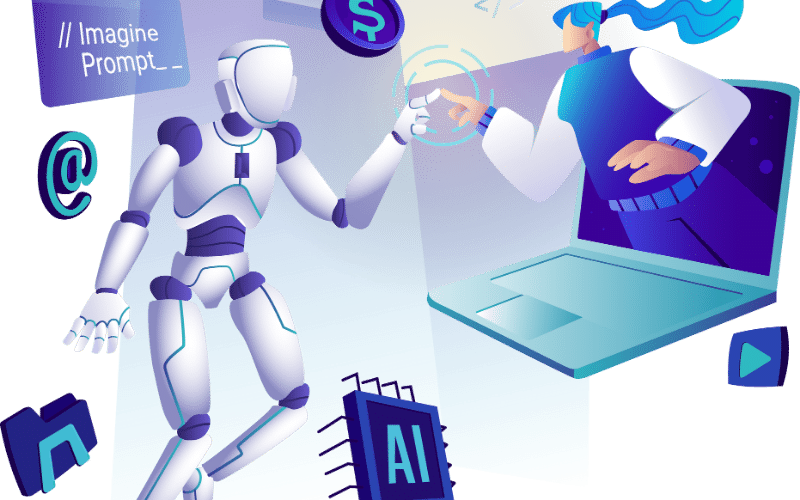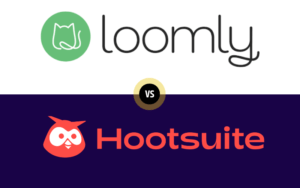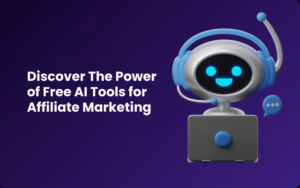AI Lead Generation is transforming the digital marketing landscape. Imagine a world where you can identify and engage with potential customers not just efficiently, but with unprecedented precision. AI lead generation leverages cutting-edge algorithms and deep data analytics to streamline your marketing efforts, ensuring you target only those most likely to convert.
By adopting AI lead generation, businesses across various industries are experiencing significant boosts in conversion rates and overall efficiency. This transformative technology not only enhances your marketing strategies but also scales your efforts to meet customer needs dynamically and cost-effectively.
Ready to revolutionize your approach to finding and nurturing leads? Explore how AI lead generation can unlock powerful growth opportunities for your business and ensure you stay ahead in the competitive digital arena.
Table of Contents
Essentials of AI Lead Generation
Overview of AI in Lead Generation
AI lead generation harnesses artificial intelligence to significantly enhance the marketing process by automating the identification and acquisition of potential customers. This technology utilizes sophisticated algorithms to sift through extensive data sets, identifying patterns and behaviors that suggest a potential customer’s readiness to engage or make a purchase. By doing so, AI enables companies to target individuals with the highest likelihood of conversion, thus optimizing marketing resources and increasing the effectiveness of campaigns.
The Evolution of Lead Generation Technologies
Lead generation has undergone a profound transformation over the years, shifting from traditional methods that relied heavily on guesswork and broad targeting to more refined, technology-driven strategies. The advent of digital marketing brought along tools like email blasts and social media advertising, which were revolutionary but still lacked a personal touch and precision.
From Manual to AI-Driven Approaches
The integration of AI into lead generation marked a pivotal development in this evolution. Traditional methods often resulted in lower conversion rates due to the generic nature of the outreach. AI lead generation, by contrast, uses machine learning and data analytics to predict which leads are most likely to convert, based on their interaction patterns and demographic information. This shift not only improves the accuracy of lead targeting but also enhances the personalization of marketing messages, making them more relevant to each recipient.
The Mechanics of AI in Generating Leads
How AI Tools Identify Potential Leads
AI lead generation tools leverage a variety of advanced algorithms to sift through data, identifying potential leads based on specific behavior and engagement patterns. These tools examine numerous data points, such as web page visits, time spent on specific content, interaction with emails, and social media engagement. By analyzing this data, AI can pinpoint which users are showing genuine interest in a product or service and are more likely to convert into paying customers.
The Role of Machine Learning
Machine learning is a core component of AI lead generation, enabling systems to continuously learn from data and improve over time. This aspect of AI is crucial for adapting to new market trends and evolving consumer behaviors without needing explicit programming for each change.
AI Algorithms in Detail
Key algorithms used in AI lead generation include:
- Predictive Analytics: This algorithm uses historical data to predict future behaviors, identifying leads who show similar patterns to previous customers.
- Natural Language Processing (NLP): Used to analyze text from emails, social media, and web content to understand customer sentiments and interest levels.
- Decision Trees: These help categorize users into different segments based on their responses and interactions, allowing for more tailored marketing approaches.
Integration of AI with CRM Systems
Seamless integration of AI lead generation tools with Customer Relationship Management (CRM) systems is vital for maximizing the utility of collected data. This integration allows for the automation of lead scoring, prioritization, and even initial contact strategies based on the lead’s predicted readiness to engage.
Benefits of Seamless Integration
Integrating AI with CRM systems helps businesses:
- Automate Routine Tasks: AI can automate the segmentation, targeting, and initial contact with leads, allowing sales teams to focus on closing the most promising prospects.
- Enhance Personalization: With AI, businesses can send highly personalized messages based on the specific interactions and behavior of each lead, significantly increasing the chances of conversion.
- Improve Efficiency: AI-driven systems reduce the time spent on manual data analysis and lead management, speeding up the lead generation cycle and increasing the overall throughput of marketing efforts.
Benefits of AI Lead Generation
Increased Efficiency and Productivity
One of the primary benefits of AI lead generation is the significant increase in efficiency and productivity it brings to marketing teams. By automating the initial stages of the lead identification process, AI frees up marketers and sales personnel to focus on more strategic activities, such as engaging directly with qualified leads and closing sales. This shift from manual to automated processes reduces the time spent on routine tasks and accelerates the sales cycle.
Enhanced Lead Quality
AI lead generation improves the quality of leads through its precision targeting and predictive capabilities. By analyzing past conversion data and identifying patterns, AI tools can score leads based on their likelihood to convert, ensuring that marketing efforts are focused on the most promising prospects. This targeted approach not only increases the conversion rates but also enhances the overall effectiveness of marketing campaigns.
Examples from Industry
Many companies across various industries have reported significant improvements in lead quality after integrating AI into their marketing strategies. For instance, a tech company might use AI to identify which visitors to their product pages are most likely to request a demo, while a retail brand could predict which email recipients are more inclined to click through and make a purchase based on past behaviors.
Cost Reduction in Marketing
AI lead generation can also lead to considerable cost savings in marketing. By improving the accuracy of lead targeting, AI reduces waste in marketing spend, ensuring that resources are allocated to campaigns and efforts that are most likely to yield returns. Additionally, the automation of routine tasks reduces labor costs and allows businesses to operate more leanly.
Long-term Financial Impacts
The initial investment in AI technology might be significant, but the long-term financial benefits are substantial. Businesses that use AI for lead generation typically see a return on investment through increased sales revenues, lower customer acquisition costs, and more efficient use of marketing budgets. These financial gains contribute to a stronger competitive position and greater profitability in the long term.
Challenges and Considerations
Data Privacy and Security Challenges
While AI lead generation offers numerous benefits, it also raises significant concerns regarding data privacy and security. As these systems rely heavily on accessing and analyzing large volumes of personal data, businesses must navigate the complex landscape of data protection regulations such as GDPR in Europe or CCPA in California. Ensuring compliance while still leveraging the full potential of AI technologies is a delicate balance that requires careful strategy and robust security measures.
The Complexity of AI Systems
Implementing AI lead generation systems involves a steep learning curve due to their inherent complexity. Businesses must not only invest in the right technology but also in training their staff to use these systems effectively. The integration of AI can also require significant changes to existing processes and systems, which can be disruptive and may encounter resistance from within the organization.
Navigating Technical Challenges
Technical challenges such as data integration, system compatibility, and maintenance of AI systems are common. These challenges require ongoing attention from IT departments to ensure that the AI tools are functioning optimally and delivering the expected benefits.
Ethical Considerations in AI Lead Generation
The use of AI in lead generation also presents ethical questions, particularly concerning the transparency of algorithms and the potential for bias in automated decision-making processes. Businesses must be vigilant about how they use AI to influence consumer behavior, ensuring that they remain ethical and transparent in their methods.
The Balance Between Automation and Ethics
Finding the right balance between leveraging AI for efficiency and maintaining ethical standards is crucial. Companies need to establish clear guidelines on the use of AI, ensuring that it enhances customer engagement without compromising ethical standards or consumer trust.
AI Lead Generation Tools and Technologies
Popular AI Lead Generation Platforms
Several platforms have emerged as leaders in the AI lead generation space, offering robust tools that integrate seamlessly with marketing and sales systems. Platforms like HubSpot, Marketo, and Salesforce use AI to enhance every step of the lead generation and management process, from initial contact to final conversion.
Features and Pricing
Each platform offers a variety of features tailored to different business needs, including lead scoring, predictive analytics, and automated engagement tools. Pricing varies widely depending on the complexity of the features, the scale of deployment, and additional services like support and training.
Custom AI Solutions for Businesses
For businesses with specific needs that off-the-shelf tools cannot meet, custom AI solutions are a viable alternative. These are tailor-made systems designed to integrate tightly with existing business processes and data systems, providing a level of customization that enhances specific operational aspects.
Case Studies of Success
Several companies have benefited from implementing custom AI solutions. For example, a real estate company might use a custom AI system to predict which clients are most likely to buy based on their browsing behaviors and interaction with online listings. These case studies often demonstrate significant improvements in lead conversion rates and overall marketing efficiency.
Emerging Technologies in AI Lead Generation
The field of AI lead generation is continually evolving, with new technologies emerging that push the boundaries of how leads are generated and nurtured.
Predictions for Future Developments
Experts predict that AI will become increasingly sophisticated, with advancements in natural language processing and machine learning algorithms that allow even more precise targeting and personalization. The integration of AI with other emerging technologies like blockchain for data security and augmented reality for immersive customer experiences is also expected.
Implementing AI Lead Generation in Your Business
Steps to Integrate AI into Your Marketing
Integrating AI lead generation into an existing marketing strategy requires careful planning and execution. Here’s a step-by-step approach to effectively adopt AI:
- Assessment of Current Processes: Begin by evaluating your current lead generation and management processes to identify areas where AI can add the most value.
- Choosing the Right AI Tools: Select AI tools that best fit your business needs, considering factors like ease of integration, scalability, and support.
- Data Preparation: Ensure your data is clean, organized, and comprehensive enough to train your AI models effectively.
- Pilot Testing: Implement the AI tools on a small scale initially to test their effectiveness and make necessary adjustments.
- Full-Scale Implementation: Once the pilot test confirms the benefits, roll out the AI tools across your marketing operations.
- Continuous Learning and Adaptation: AI systems improve over time, so continually monitor their performance and tweak your processes as needed for optimal results.
Measuring the Success of AI Implementations
To evaluate the effectiveness of AI in your lead generation efforts, focus on specific metrics that reflect AI’s impact:
- Lead Quality and Conversion Rates: Track improvements in the quality of leads and conversion rates after implementing AI.
- Efficiency in Lead Processing: Measure changes in the speed and efficiency with which leads are processed and qualified.
- ROI from Marketing Campaigns: Analyze the return on investment from marketing campaigns pre and post-AI integration to gauge financial impact.
Key Metrics and Analytics
Employing advanced analytics can help you understand and refine your AI strategies. Use metrics like click-through rates, engagement rates, cost per lead, and customer lifetime value to make informed decisions.
Best Practices for AI Lead Generation
For businesses looking to maximize the benefits of AI in lead generation, consider the following best practices:
- Focus on Data Quality: High-quality data is essential for training effective AI models.
- Ensure Transparency and Compliance: Be transparent about how AI is used in your processes and ensure compliance with all relevant data protection regulations.
- Leverage Expert Insights: Work with AI and marketing experts to tailor AI implementations to your specific business needs and goals.
- Foster a Culture of Innovation: Encourage a culture that embraces new technologies and continuous improvement.
Future of AI Lead Generation
Trends and Innovations in AI
As AI technology continues to advance, new trends and innovations are shaping the future of AI lead generation. These advancements are not only enhancing the efficiency and effectiveness of lead generation processes but are also introducing new capabilities that were previously unimaginable.
How AI Is Getting Smarter
The continual improvement in machine learning algorithms means AI is becoming more adept at understanding complex patterns and behaviors. This leads to even more accurate predictions and better targeting of potential leads. Additionally, as AI systems gain the ability to process and analyze data in real-time, they can offer up-to-the-minute insights that help businesses respond more quickly to market changes.
Integration with Other Technologies
AI is increasingly being integrated with other cutting-edge technologies, such as the Internet of Things (IoT), augmented reality (AR), and blockchain. This convergence is opening up new avenues for creating more personalized and engaging customer experiences, as well as enhancing data security and transparency in lead generation processes.
The Role of AI in the Future of Marketing
AI lead generation is set to play a pivotal role in the future of marketing, shifting the focus from quantity to quality when it comes to lead acquisition.
- Personalization at Scale: AI enables businesses to achieve a level of personalization at scale previously unattainable. Marketers can use AI to craft customized messages tailored to individual prospects based on their unique behaviors and preferences.
- Predictive Customer Journeys: AI’s predictive capabilities will allow companies to anticipate a prospect’s needs even before they articulate them, effectively guiding them through the sales funnel towards conversion.
- Ethical Use of AI: As the technology becomes more pervasive, there will be an increased focus on the ethical use of AI. This includes ensuring that AI systems are free from biases and that they respect user privacy and data protection standards.
FAQs on AI Lead Generation
What is AI lead generation?
AI lead generation refers to the use of artificial intelligence technologies to automate and enhance the process of identifying and attracting potential customers. By leveraging AI, businesses can analyze large datasets to identify patterns and behaviors that indicate a high likelihood of conversion, thus optimizing their marketing efforts.
How does AI improve the accuracy of lead generation?
AI improves the accuracy of lead generation by utilizing machine learning algorithms to analyze historical data and predict future behaviors. This allows businesses to target individuals who are more likely to be interested in their products or services, thereby increasing conversion rates and reducing waste in marketing budgets.
Can small businesses benefit from AI lead generation?
Yes, small businesses can significantly benefit from AI lead generation. There are many AI tools available that are affordable and easy to integrate with existing marketing platforms. These tools can help small businesses compete more effectively by enabling them to target their marketing efforts more precisely and efficiently.
What are the main challenges associated with implementing AI in lead generation?
The main challenges include the complexity of AI systems, the need for quality data, and concerns regarding data privacy and security. Additionally, there can be a significant learning curve and resource requirement for integrating AI into existing systems.
Is AI lead generation expensive?
The cost of AI lead generation can vary depending on the complexity of the system and the scale of deployment. However, there are many cost-effective AI tools available that offer scalable solutions suitable for businesses of all sizes. The long-term cost savings and increased efficiency often justify the initial investment.
How can businesses ensure ethical use of AI in lead generation?
To ensure ethical use of AI in lead generation, businesses should focus on transparency, compliance with data protection laws, and the elimination of biases in AI algorithms. It’s important for businesses to be open about how they use AI and to ensure that their use of technology respects customer privacy and trust.
In conclusion, AI lead generation represents a significant shift in the landscape of digital marketing, offering unparalleled advantages in terms of efficiency, effectiveness, and the ability to engage potential customers at a more personal level. As businesses continue to navigate the complexities of modern marketing, the integration of AI into lead generation processes is becoming not just an advantage but a necessity.
The key to successful AI implementation lies in understanding its capabilities and limitations, selecting the right tools, and continuously adapting to the evolving technological landscape. By embracing AI, companies can not only anticipate the needs of their prospects but also respond to them in real-time, creating a dynamic marketing environment that drives growth and innovation.
As we look to the future, the role of AI in marketing is set to grow even more prominent, reshaping strategies and creating opportunities that were once thought impossible. Now is the time for businesses to invest in AI lead generation, harness its potential, and set the stage for a future where smart technology and human creativity combine to unlock new horizons in customer engagement and business success.
Are you ready to transform your lead generation process and drive better results with AI? Discover how our AI lead generation solutions can empower your business to reach its full potential. Contact us today to learn more about our services and take the first step towards revolutionizing your marketing strategy with the power of AI.





